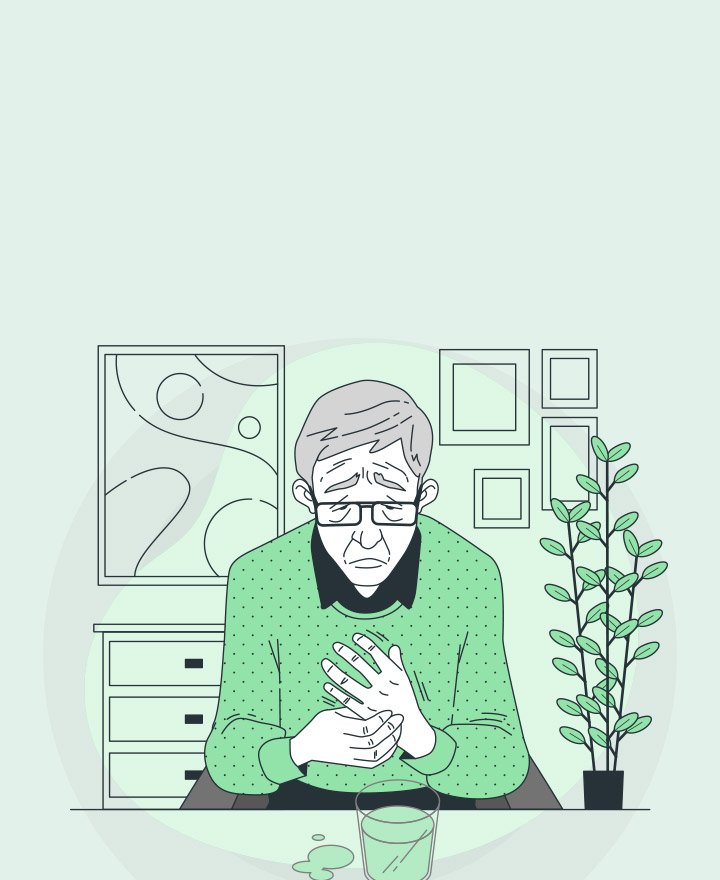

Parkinson's Disease: All that You Need to Know
Parkinson's disease is a neurodegenerative disorder that affects the smooth functioning of the brain and disrupts motor function. It leaves the person unable to control their movements causing shaking, stiffness, lack of balance and coordination, and difficulty in verbal articulation. This progressive degeneration and loss of control can lead to mental and behavioural changes such as depression, issues with sleep, fatigue and memory loss.
Causes of Parkinson's Disease
Scientists say that this disease results from impairment or destruction of brain nerve cells in the basal ganglia, which are responsible for body movement control. The reason why they die is still not clear but it is known that these nerve cells produce a chemical called dopamine, which is reduced with their destruction.
Parkinson's causes the body to lose the nerve endings that produce norepinephrine, a neurotransmitter and hormone that is responsible for controlling heart rate and blood pressure in the body. This results in the malfunctioning of the nervous system.
Some Facts about Parkinson's Disease
• Shaking Anyone could be vulnerable to this disease, but, some research suggests that men are more vulnerable than women.
• Most people suffer from this disease after the age of 60 years while, around 5% to 10% develop this disease before 50
• Some forms of this disease are inherited, and some are linked to gene mutations.
Parkinson’s Disease - Symptoms
Parkinson’s Disease symptoms become more noticeable over time as the intensity of changes increases.
Some common Parkinson’s Disease symptoms are:-
• Shaking or tremors in arms, legs, mouth, and face
• Difficulty in movement
• Muscle stiffness
• Progressive loss of balance and coordination
• Changes in emotional behaviour
• Depression, sleep problems
• Problems in chewing, speaking and swallowing
• Digestion problems like constipation
• Skin problems
Symptoms and their intensity differ in every patient - some symptoms could begin on one side and later spread to the whole body. In the beginning, aperson may experience mild difficulties in brain or motor function that family members may notice. These include a person speaking too softly, memory lapses, a lack of expression on the face, or abnormal twitching or movements of body parts.
Diagnosis of Parkinson's Disease
There is no specific test that can diagnose Parkinson's Disease. A specialized medical practitioner or a neurologist will note down the patient's and family's medical history, their signs & symptoms, and conduct a physical and neurological exam before arriving at a diagnosis.
Around 15% of patients with Parkinson's have some family history of the disorder. But the genetic changes and mutations that cause this are not fully understood. If a patient is exhibiting Parkinson’s disease symptoms, then diagnosis is easier. Non-genetic cases are tougher to diagnose.
Another way doctor's check is if the symptoms have decreased by prescribing Parkinson’s medications. However, some other diseases have similar symptoms as Parkinson's, so getting a proper diagnosis is necessary.
Early diagnosis of this disease is crucial, as certain medications are more effective if administered in the early stages of the disease. Hence, regular checkup for those over 50 years of age, especially with a family history of Parkinson's is important.
Treatment of Parkinson's Disease
Three common ways of treating Parkinson's Disease are:
1. Medication–
While they help to reduce and control the symptoms as mentioned below, it should only be consumed as directed and prescribed by physician
• Increases release of dopamine in the brain.
• Improves the movement of brain chemical neurotransmitters which are responsible for transferring information between brain cells.
• Controls the non-motor function related symptoms to some extent
2. Surgical procedure–
Surgery could be useful for patients who do not respond to medications well.
• Doctors implant electrodes in the brain and a small electrical device in the chest and when these both are connected, they control the body's involuntary movements.
3. Other therapies
Other therapies to reduce the symptoms are:
• Physical and speech therapies that could help in managing voice, physical, and mental functions
• Muscle strengthening, balance, and coordination exercises
• Yoga therapy
• Massage therapy
• Nutritious diet along with prescribed medication
Conclusion
Parkinson's is a progressive neurological disease that affects the brain and nervous system and causes loss of motor function. Early diagnosis of this disease is important as certain medications are more effective if administered at an early stage.
This disease can cause major disruptions in a person's life and hence support of family members, friends and one's community can play a major role in disease management and boosting patients' morale.
One of the important components of our overall wellness is also being financially secured. Healthcare emergencies can happen any time, but a good health insurance policy can protect you from such uncertain situations. To know more about Wellness and other health related tips, visit the Wellness Corner.
Disclaimer: This blog provides general information and discussions about health and related subjects. The information and other content provided in this blog, website or in any linked materials are not intended and should not be considered, or used as a substitute for, medical advice, diagnosis or treatment. Kindly contact your Doctor before starting a new medicine or health regime.
Source: Seniority
Related Articles
Everything You Should Know About Anxiety
What is obesity & Overweight. Causes & Symptoms of being obese and overweight
Eco-anxiety - Symptoms, Causes, and How to Cope
Published on August 01, 2022

















 Health Insurance
Health Insurance  Travel Insurance
Travel Insurance  Car Insurance
Car Insurance  Cyber Insurance
Cyber Insurance  Critical Illness Insurance
Critical Illness Insurance
 Pet Insurance
Pet Insurance
 Bike/Two Wheeler Insurance
Bike/Two Wheeler Insurance  Home Insurance
Home Insurance  Third Party Vehicle Ins.
Third Party Vehicle Ins.  Tractor Insurance
Tractor Insurance  Goods Carrying Vehicle Ins.
Goods Carrying Vehicle Ins.  Passenger Carrying Vehicle Ins.
Passenger Carrying Vehicle Ins.  Compulsory Personal Accident Insurance
Compulsory Personal Accident Insurance  Travel Insurance
Travel Insurance  Rural
Rural